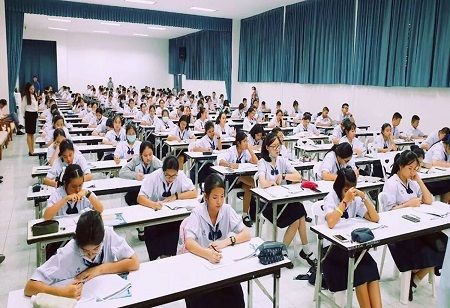-
In an important step to improve the Thai education system, Mr. Siriphong Angsakulkiert, the Deputy Minister of Education, issued a statement for the establishment of a working committee responsible for the management of examination processes for candidates entering Mathayom 1 and Mathayom 4. This came after findings on a field visit where a number of problems concerning the examination criteria were found. The Education Minister, Police General Permpoon Chidchob, commissioned Mr. Siriphong with this mission to normalize and streamline student testing among schools.
In the visit, it was evident that the existing selection criteria for admitting students varied from school to school, which could result in possible inequalities. For instance, in Nonthaburi Province, schools worked together to develop a common set of exam questions for Mathayom 1 and Mathayom 4. This is in an effort to decrease inequalities and make the examination process fairer. Mr. Siriphong underscored the significance of such collaborations, saying, "This helps reduce inequality and makes the examination process more fair".
Among the critical issues raised was the load experienced by students commuting from other provinces to sit for exams in renowned Bangkok schools. Such travel is not only economically expensive but also logistically challenging for families. To solve this, Mr. Siriphong suggested the establishment of a central examination system, just like national basic education tests, referred to as O-NET. He proposed that schools with high competition rates may conduct online tests at central test centers in other provinces, mirroring the organization of the General Aptitude Test (TGAT) and the Academic/Professional Aptitude Test (TPAT).
Mr. Siriphong, however, admitted that there are issues over the appropriateness of applying O-NET for this intention since it is intended to measure general academic performance and not specific selection criteria for further education. He says, "The O-NET test was intended to evaluate general learning outcomes, whereas selection tests are aimed at measuring students' readiness for the subsequent level of education". This inconsistency requires more discussions to develop an appropriate assessment system that is consistent with the objectives of student selection.
Now, initial discussions are in progress with top schools, including Mahidol Wittayanusorn School and Chulabhorn Royal Academy schools, which have shown interest in participating in this project. Mr. Siriphong observed, "If these leading schools are willing to ease the students' burden from examinations and consider setting up regional testing centers, it will be a major step towards raising people's confidence in the education sector". He also said that if the process went smoothly, the new policy could be running by the 2569 academic year.
Parallel to these efforts, the Teachers Council of Thailand has taken steps to standardize teachers' qualifications. The Secretary-General of the Teachers Council, Assoc. Prof. Dr. Amornrat Weerathammo, indicated that the council has developed guidelines for testing and evaluating teachers' professional competencies. This is a significant step toward awarding professional teaching licenses, which are regulated according to provisions enacted in 2022 and revised in 2024.
At the February 27, 2025, Teachers Council session, the council endorsed the outcomes of the second round of professional competency tests with 5,644 candidates clearing the exams. Assoc. Prof. Dr. Amornrat says, "For those who succeed in passing the tests and examinations, the results can be utilized to ask for a professional teacher license in accordance with the criteria and ways laid out by the Teachers Council". This initiative is a huge step forward toward making sure teachers have standardized qualifications required for efficient teaching.
Furthermore, the council has established a clear process for revoking licenses if any discrepancies arise regarding the qualifications of those who passed the assessments. This ensures that the integrity of the teaching profession is upheld. The council's decisions regarding the assessments are final, reinforcing the importance of maintaining high standards within the teaching community.
For those who wish to know their status or the outcome of the tests, the Teachers Council has put this information online at www.ksp.or.th. This openness is part of a larger move towards building confidence in the education system and making sure that only qualified personnel are tasked with educating the next generation.
As Thailand perseveres in negotiating the intricacies of education reform, the activities initiated by Mr. Siriphong and the Teachers Council amount to a genuine attempt at refining the quality of education and securing equal opportunities for all students. By solving issues in examination processes and uniformizing teacher qualifications, these activities stand to build an enhanced, evenhanded, educational system.
🍪 Do you like Cookies?
We use cookies to ensure you get the best experience on our website. Read more...

